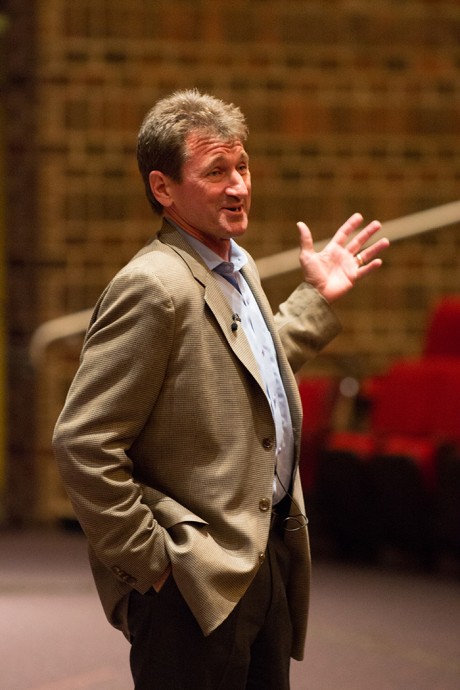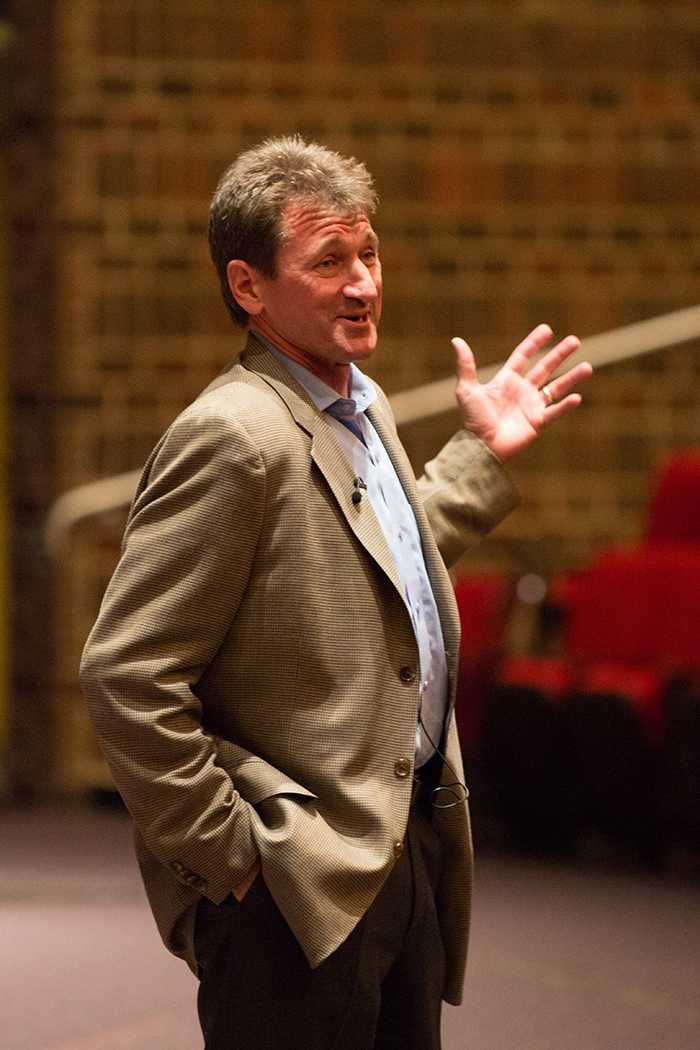
It can be found everywhere, but people are still looking for more of it. People cannot live without it, so governments are constantly seeking out the cheapest solution for it. Heated arguments commonly arise over the way it is being used and consumed.
Energy is a precious commodity in modern living, and it is in a period of transition. Among other things, opinions on nuclear energy are changing, and renewable resources are entering the conversation on a larger scale.
Scott Tinker, state geologist of Texas and head of the Texas Bureau of Economic Geology, returned to his alma mater for the Distinguished Scientists Lecture Series at 7:30 p.m. on Monday, Sept. 24, in Laurie Auditorium to present his film “Switch,” a documentary exploring the future of energy around the world.
Tinker said that the goal of the film is to be objective and inclusive in its examination of energy while presenting the information in a more simplified manner, to put it in terms that everybody can understand.
During the question-and-answer session following the film screening, Tinker discussed how the environmental consciousness of society has evolved over the years.
“We never recycled, but it’s cultural now,” Tinker said. “I can walk along with a plastic bottle, and if I throw it in a regular trash can, I’m going to feel guilty. It used to not be like that. Recycling wasn’t always around in as big a scale of availability as it is now.”
Tinker insists that the environmental push is real, but it is still not enough to drive most governments. Economic barriers present a major obstacle for governments and individuals looking to pursue and install more environmentally friendly sources of energy.
“There’s a lot of oil left in the earth and a lot of natural gas. It’s there. To transition away from it, something has to come in that’s more available, reliable and affordable,” Tinker said.
Energy is in high supply and demand across the world, and governments have to keep up to continue to provide this service to growing populations.
“China has around 1.4 billion people, and they need energy. They are building a new coal power plant every eight to 10 days,” Tinker said.
Scale is a huge challenge for environmental development. Without a large support system, it will be hard to change the methods countries use to provide and consume energy.
Price also drives the energy choices of these countries, but if enough people implement new sources of energy into their lives, that could help make traditionally costlier alternative energy sources such as solar and wind energy a more available option to governments.
“If more and more people start to consider energy savings, the economy of scales kicks in, and things become more affordable. These are cultural things that we just don’t think about, and we really need to start thinking about conserving energy,” Tinker said.
Thomas Gardner, the Trinity University Herndon Distinguished Professor of Geology, agrees with Tinker’s analysis of economics hindering the establishment of cleaner energy sources.
“The price of the energy is going to drive our choices, so we’re basically always going to go for the cheaper energy source. Some small percent of the population will try to do the right thing, so they’re willing to pay a little more for cleaner energy. That’s not going to be most people, though,” Gardner said.
Technology is aiding energy research and development tremendously, but it is also proving to be a hazard to the environment in some cases.
“Efficiency is going to have to come into play big time, and that’s being driven by technology and technological improvement,” Gardner said. “There was an article in The New York Times that said 25 to 30 percent of the U.S. electrical output in 2010 was consumed by servers and data centers running Facebook and Google. In 2005, it was two percent. Nobody even thinks about that. Most of these data server farms are some of the most inefficient things that we operate. Nobody can afford to go offline, so there are a lot of redundant parts running in these server farms.”
Jamie Banks, a sophomore who attended the Switch screening, appreciated the film’s call for the nation to shift to a more renewable energy source before it is too late for the environment.
“I think we as college students need to remember that the simple things matter, like switching off your lights or conserving water or even carpooling instead of using a lot of cars to get to the same place,” Banks said.
Tinker made it clear that the scale of global energy demand is phenomenal, but no energy source comes without a challenge. Each energy source has its own set of risks and rewards, and until governments can find economically friendly energy solutions, people will have to wait and do their part to encourage the use of environmentally friendly energy sources.







